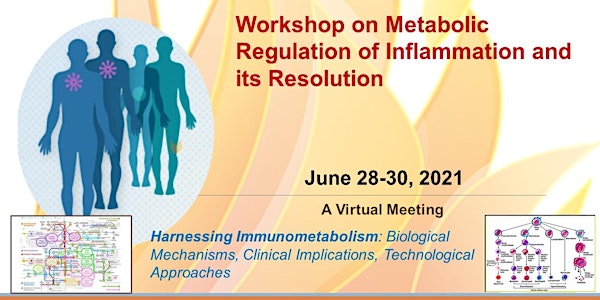
Metabolic Regulation of Inflammation and its Resolution
This workshop encourages cross-disciplinary discussion on modulating inflammation to treat diseases through metabolic regulation.
Date and time
Location
Online
About this event
Metabolism and inflammation (the immune system’s response) have been viewed as two separate processes with distinct but critical functions for our survival: metabolism regulates the utilization of nutrients, and inflammation is responsible for host defense and repair; both respond to an organism’s stressor to restore its homeostasis. The interaction between metabolic status and immune response (coined as immunometabolism in 2011) plays an important role in maintaining homeostasis or promoting disease development. Understanding these interactions is critical in developing necessary tools for facilitating novel therapeutic approaches in preventing and treating diseases, including cancer. This workshop will bring together basic scientists, technology developers, and clinicians to discuss current state-of-the-art, innovative approaches, challenges, and opportunities to understand and harness immunometabolism in modulating inflammation and its resolution.
Meeting Booklet
Agenda
June 28, 9:30 am-2:40 pm (EDT), Biological Mechanisms
Keynote: Immunometabolic crosstalk in trained immunity and inflammation: George Hajishengallis, DDS, Ph.D., Penn Dental Medicine
Session I: Metabolic effects on cells associated with inflammation-biology and mechanisms
- Restoring glucose uptake rescues neutrophil dysfunction and protects against systemic fungal infection in mouse models of kidney disease: Partha Biswas, Ph.D., University of Pittsburgh
- Role of metabolic sensor AMPK in regulaiton of tolerance by dendritic cells: Bart Everts, Ph.D., Leiden University Medical Center
- B cell fate determination through interplay of multiple signaling pathways: Munir Akkaya, MD, Ph.D., National Institute of Allergy and Infectious Diseases
- Metabolic enzymes and intermediates in control of macrophages: Jan Van den Bossche, Ph.D. Amsterdam University Medical Center
Session II: Metabolic effects on pathways associated with inflammation-biology and mechanisms
- Balancing hepatic nutrient metabolism and responses to inflammation to prevent post-thrombotic syndrome: Jennifer Estall, Ph.D., Montreal Clinical Research Institute
- Metabolic processes that affect anti-tumor immune responses: Santosh Vardhana, MD, Ph.D., Memorial Sloan Kettering Cancer Center
- The role of mast cells and biliary senescence in the promotion of NAFLD phenotypes and microvesicular steatosis: Heather Francis, Ph.D., Indiana University School of Medicine
- Hold the reins! oxidants regulate neutrophil inflammation: Juhi Bagaitkar, Ph.D., University of Louisville
Panel Discussions
---------------------
June 29, 9:30 am-2:40 pm (EDT), Clinical Implications
Keynote: Immunometabolic homeostasis in health and disease: Gokhan S. Hotamisligil, MD, Ph.D. Harvard T.H. Chain School of Public Health
Session III: Novel immunometabolic approaches in combating COVID-19
- Monitoring and modyulating the arachidonate cascade to prodict and treat diseases: Bruce Hammock, Ph.D., UC Davis
- Thrombosis in COVID-19: an imbalanced of "Virchow's Triad" driven by inflammation, altered surface and flow: Marvin Slepian, MD, Univ of Arizona
- RAGE/DIAPH1 axis meets COVID-19: at the crossroads of metabolism and the innate immune response: Anne Marie Schmidt, MD, New York University
- Metabolomics of COVID-19: Gary Patti, PhD, Washington University
Session IV: Therapeutic and clinical implications
- Metabolic barriers to effective cancer immunotherapy: Greg M Delgoffe, Ph.D., University of Pittsburg
- Metabolic regulation of hematopoietic stem cell differentiation and T cell effector function: applicaitons to treatment : Naomi Taylor, MD Ph.D., National Cancer Institute/Center for Clinical Research
- Lipid uptake pathways: energetics, lipotoxicity and cell polarization: Ira Goldberg, MD, New York University
- Metabolic-epigenetic regulation of macrophage function through histone lactylation: Lev Becker, Ph.D., University of Chicago
Panel Discussions
---------------------
June 30, 9:30 am-2:40 pm (EDT), Technical Approaches
Keynote: Metabolic checkpoints of inflammation: Vishwa Deep Dixit, DVM, Ph.D., Yale School of Medicine
Session V: Target discovery: metabolic biomarkers
- Endogenous itaconate confers late inflammasome tolerance: major cell-intrinsic phenotype in activating macrophage: Maxim Artyomov, Ph.D., Washington University
- Dietary inflammatory potential of cardiovascular diseases: Frank B Hu, MD Ph.D., Harvard T.H. Chain School of Public Health
- Utilizing fully automated abdominal CT–based biomarkers for opportunistic screening for metabolic syndrome in adults without symptoms: Ronald Summers, MD, Ph.D., National Institutes of Health Clinical Center
- Imaging metabolic heterogeneity in the tumor: Melissa Skala, Ph.D., University of Wisconsin-Madison
Session VI: Tools and techniques for interrogating immunometabolism
- Metabolic profiling using stable isotope tracing reveals distinct patterns of glucose utilization by physiologically activated CD8+ T cells: Russel Jones, Ph.D., Van Andel Research Institute
- Glucose metabolism and granuloma composition in nonhuman primates with tuberculosis: Josh Matilla, Ph.D., University of Pittsburgh
- Noninvasive imaging of cardiac inflammation using hyperpolarized magnetic resonance: Damian Tyler, Ph.D., University of Oxford, UK
- Radiation-induced immunometabolic dysfunction in NHPs following total body irradiation- a longitudinal study: Kylie Kavanagh, DVM, Wake Forest School of Medicine
Panel Discussions
____________________________________________________________________________
Organized by
Pushpa Tandon, Ph.D.
Molecular Imaging Branch
Cancer Imaging Program, Division of Cancer Therapeutics and Diagnostics
National Cancer Institute
(240) 276-5971
tandonp@mail.nih.gov